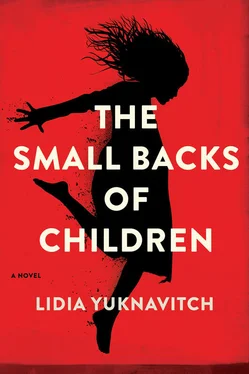He looks at the back of his house. It stares dully back at him. Wifeless. Sonless. Without life. He goes inside, and when he looks back through the window to the backyard, all he sees is black, like the screen before the film begins, the moon a white projector’s beam.
This is the first night in seven he has come home from the hospital. It’s the only respite he has given himself. A night to fight and release the chemical chaos of things. Without turning any lights on, he walks through the kitchen, opens the refrigerator, removes a Newcastle beer, twists the cap off, drinks most of it standing in the fluorescent glow. Then he removes his Everlast workout gloves, carefully unwraps his hands, the black bands falling to the floor like tired-out snakes. They sting from the gap between cold night air and warm domesticity.
He grabs another beer, then walks through the dark and lifeless house to his wife’s writing room. He stands in front of her bookshelves. He stares at the shelf of her own books, books written by her. The beer going down his throat branches out across his chest. His throat is warm. His hands ache. Their lives together make a list in his skull, because that’s all he’s able to think or feel.
Before she was a writer, she was an abused daughter.
Before he was a filmmaker, he was a neglected son.
Before he turned to art, he was a bouncer at a casino.
Before she turned to art, she was a flunking-out addict.
Both of them briefly arrested and incarcerated.
Both of them stealing their lives back, pursuing lives of the mind. Both of them carrying invisible injuries, injustices, betrayals, all in silence.
When they first met, he took her to Gold’s Gym. Taught her how to box, how to defend herself, stayed with it even when she accidentally punched herself in the nose. She took him to a swimming pool to do laps, because she said water was the one place she felt free, and he swam laps even though he was allergic to chlorine.
She introduced him to the movies Cool Hand Luke and On the Waterfront.
After the gym, he played Bach for her on the cello.
It was as if the crappiness of both their lives opened up and let them at each other.
Before they were anyone, they were who they would become in each other’s arms, each of them passing through crucibles to reach the other, each of them arriving at art instead of death.
She writes stories of their lives and desires and fears.
He makes art films based on the stories.
She collects experiences and images and pulls them down to the page.
He takes actions and images and projects them up onto a screen.
Who are they? What is their love? Is it their son? Is it their art?
He touches the spines of her books in the dark.
Love isn’t what anyone said. It’s worse. You can die from it at any moment.
He picks out a book she wrote, containing one of the stories he adapted to film. The film is nearly finished. The closing scene is her. She is walking naked toward the angry ocean on a cold day in November. Her blond hair wrestles the wind. She keeps walking even after she is knee-high in waves. He knew, as he filmed her, that the water was freezing. He also knew she wouldn’t flinch. She walked far enough to dive straight into the oncoming waves, the camera trained on her, their son perched in a carrier on his back. And then she swam against the waves. Bold strokes into white-frothed swells. Far enough that he screamed, “Cut!” Far enough that he stopped filming. Far enough that he started to yell into the wind and the noise of the surf — it was a cold day, no one else around on the beach—“ Stop! Come back! ” Her name, but his voice was swallowed by gales and tides. His chest tightening. His thoughts racing as his body readied itself for action: Set the child on the shore remove your boots remove your jacket and pants enter the ocean for her even though you are a weak swimmer enter the ocean for her do not watch her disappear into water. Their son’s voice behind his head a cooing sound, “Mama,” as he reached for the strap at his shoulder.
But she did stop.
He saw her turn back to look at them, the way a seal’s head pokes up sporadically to eyeball a human on shore.
And then she swam back to them.
She left the water cold and shivering, and he wrapped her in a towel, and she said to him plainly and without the suggestion of drama, “Did you get the shot? Was it okay?” Her lips blue, even as she smiled, a little like a corpse mermaid.
Is their love their art? Are their lives making art?
He stares at the spines of the books in her writing room. He feels she is the other side of things — the balance, the space to his motion, velocity, force. If in him need drives the fist, then in her space receives all action. But it is not a velvety romantic love. It is creative and destructive. He thinks of her body. He wants to fuck the room of her. The whole house.
Suddenly he needs to be in the bedroom. He makes his way upstairs, into the higher-sexed place of their marriage. In their bedroom he sees deep burgundy and indigo sheets in wrestled piles on the bed. He can smell their sex. Dead candles, waiting for dusk and sex, hide in the shadows. On the wall above where her sleeping head should be there are black-and-white photographs of. . what? Him and his wife. Right? Taken by their photographer friend, lovingly. Right? He pauses and his eyes fall on them, on their revelation, on their presence. Two-dimensional selves in giant oak frames, perfectly square. The photo of her: wife half underwater, half surfaced, seal-like and caught off guard. Her hair splayed out like seaweed. The photo of him: a fighting scene, his own arm extending mid motion in blur, half his face in the frame, half not, the object of the blow entirely out of the shot. He looks at the two images, caught there like that above the world of the bed, and wonders what he is really looking at. Is it true? His chest hurts some. He steadies himself by sitting on the edge of the bed.
His hands rummage around in the bedside table drawer. He isn’t looking. He’s feeling. The aqua glass pipe finds his hand. And the pot inside a plastic bag, just like in anyone’s house. The perpetual life of the lighter finding his fingers. In this way he is able to breathe like a normal fucking man again. He fills his lungs with haze and lift and the promise of the rational mind’s loosening. He misses his son. His body aches for his wife. Thoughtless and animal heavy. Come home , he thinks, like a mantra. Swim home .
Alone, in their house, without her, he does what men do when they are not crying. He puts his beautifully violent face in his own hands and hangs his head and his shoulders heave. Something like silent pantomime crying. And then it breaks through him, guttural sounds, and then the sounds grow into moans and then he’s throwing the glass pipe at the photo of himself and shattering glass all over the place. Goddamn it. Nothing nothing nothing but this: he cannot save her, fix her, make it right . There is nothing he can do but love his son and love his wife and wait. He sits up on the edge of the bed.
What is a man without action?
He drops his head, defeated.
That is when he sees it, down beyond his scabbed and roughened hands resting on his thighs, past his battered knees balling up in front of him, all the way down to his feet planted helplessly there on the hardwood floor. The edge of a book jutting out quietly from beneath the bed. Without thinking he reaches down and picks it up. It is not a published book, like the rows and rows that fill their home. It is not one of her books, and yet it is most definitely her book. It is a book people write in when they mean for it to be kept out of the world. It is a journal. Its cover burnished red and worn. A leather strap wrapped and wrapped around it. A pen periscoping up from the top.
Читать дальше












